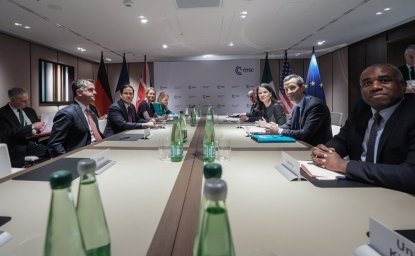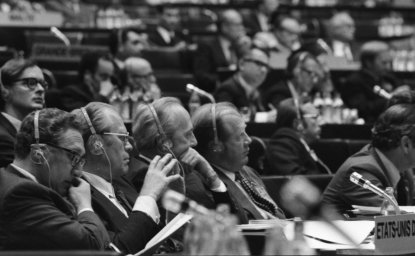Putin's Russia Today: Sources of Stability and Emerging Challenges


"Comparative transitology tells us that President Vladimir Putin cannot succeed, that he is not the right man for the right time in Russia. The political system that he is trying to put in place looks archaic and almost irrelevant in the 21st century," stated Andrei Kortunov, President, ISE Center (Information. Scholarship. Education.), Moscow, and President, New Eurasia Foundation, Moscow at a 7 November 2005 lecture at the Kennan Institute. "Theory tells us Putin cannot be successful; however, he is. This paradox requires an explanation—why does this system still work in Russia?"
Whether the system he is building is described as "managed democracy" or "technocratic authoritarianism," said Kortunov, it is not unique. Kortunov argued that Putin has created a regime in Russia that is very similar to regimes in Latin America and parts of Asia in the mid-twentieth century. Russia has the institutional features of a mature democracy, but the political environment is uncompetitive. The leadership is divided between technocrats and military and security officers, and foreign policy is a confusing mix of pro-integration rhetoric and isolationist practice.
Kortunov noted that this type of regime has produced economic prosperity and eventual democratization in the past. However, he warned that these successes have mostly occurred in small countries. More importantly, this authoritarian model was successful primarily in countries that faced the challenge of transformation from a rural to an industrial society. It is therefore unlikely to help Russia succeed in the post-industrial age. "With the system Putin built," Kortunov argued, "it will be easy to create another Uralmash, but it is much more difficult to start another Microsoft."
Political theories may predict that Putin's system of governance should not be effective for Russia in the modern era, continued Kortunov, but Russia has experienced a degree of prosperity and stability during his tenure. He cited several reasons for Putin's apparent success: high world oil prices; the lingering results of the 1998 financial crisis, especially the resulting low cost of domestic goods and labor; positive relations with the West; and the discrediting of liberal political parties during the Yeltsin era.
Kortunov argued that all of these factors are now diminishing in importance. Oil prices should eventually drop. Even if they remain high, this will decrease incentives for economic reform and raise the value of the ruble, thus hurting domestic industry. The costs of domestic production in Russia continue to rise. Russia's good relations with the West have not resulted in actual integration into international institutions, and while domestic political opposition to Putin is fragmented, his popularity, although still high, is decreasing.
Additionally, Kortunov noted, Russia has been significantly less stable during Putin's second term. For example, administrative reforms have paralyzed the government, Russia's largest oil company was destroyed, unpopular reforms monetizing social benefits led to protests, and instability has proliferated in the north Caucasus.
The Putin administration is responding to these challenges by promoting centralization and increasing its control of society. However, there are limits to the effectiveness of such efforts to centralize, Kortunov contended. First, the power structures of the Russian state are not effective, as demonstrated by the continuing conflict in Chechnya. Second, civil servants are corrupt and not necessarily loyal to the political leadership. Third, there are conflicting regional and institutional interests within the Russian state. Without real forms of institutionalized political discourse, said Kortunov, political infighting limits the ability of the government to introduce authoritarian measures. Finally, Putin cannot isolate Russia from the outside world. As more people get their training from abroad, travel abroad, and Russian business enters the global market, the state's options for increasing authoritarianism and centralization become increasingly limited.
Kortunov observed that the race for political succession in 2008 is already underway, but contended that a democratic breakthrough is unlikely. The most likely outcome, he said, is that the government will settle on a successor who will then use state resources to build support by funding popular social programs. Such a successor would have to dismantle Putin's image, as Putin had to with his predecessor, Boris Yeltsin. A second option would be a redistribution of constitutional power from the president to the prime minister, with Putin returning to government as prime minister. Neither of these options, Kortunov emphasized, will resolve Russia's long-term problems of building a prosperous, post-industrial state.
The least likely outcome, in Kortunov's view, is for an opposition campaign to win the presidency, either through the ballot box or a popular uprising. He noted there is no cohesive opposition in the Russian Duma to rally support, and no figure with the equivalent stature of Ukraine's Viktor Yushchenko to run as a candidate.
Regarding Russia's future, concluded Kortunov, "I am moderately pessimistic in terms of the political dynamics, but I am much more optimistic about the social dynamics. And I think that with all the political developments we might see in the coming months, we should focus our attention on social transformation, which is less visible but, at the end of the day, is much more important."


The Kennan Institute is the premier US center for advanced research on Eurasia and the oldest and largest regional program at the Woodrow Wilson International Center for Scholars. The Kennan Institute is committed to improving American understanding of Russia, Ukraine, Central Asia, the South Caucasus, and the surrounding region through research and exchange. Read more




